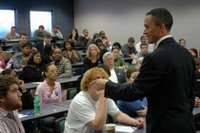 "Everybody wants to talk about my family; I just want to talk about the issues."
"Everybody wants to talk about my family; I just want to talk about the issues."Congressman Harold Ford Jr., D-Memphis, did exactly that when he spoke to a group of students Wednesday in a town hall meeting sponsored by MTSU College Democrats.
Ford referred to his family's long history in Tennessee politics, which has been overshadowed by corruption. Many have focused on Ford's family, but Ford is trying to distance himself from the negative connotations associated with the family name.
Ford, known simply as "Junior" on the campaign trail, is vying to replace Senate Majority Leader Bill Frist.
Ford spoke of his "new covenant with Tennesseans," which has five principles that make up the platform of his campaign.
He said he hopes to pass a constitutional amendment requiring a balanced budget, reduce America's dependence on foreign oil, make healthcare more affordable, pass a campaign ethics law and guarantee college tuition for students willing to serve their country.
"If a student in high school wants to go to college," Ford said, "they're probably going to have a better chance of finding a job and supporting themselves and being less of a drag on the federal government."
He said if students work hard throughout their education and have good grades, he wants them to go to "the best school their mind lands them, not the best school they can afford."
Ford said that according to his proposal, the government would pay full tuition for deserving students on the condition that "you have to give back in the form of service to your country."
Ford envisions the creation of several service corps as a way to facilitate that process.
"Teachers corps, nurses corps - people can give back at hospitals, senior centers, rehabilitation centers, emergency rooms," he said.
Another issue that Ford concentrated heavily on was national security. He said that for America to win the "war on terrorism," we need a strong military, and we need to depend less on foreign oil.
He also said that Americans need to understand the rest of the world better.
"We don't speak their language," Ford said. "We don't eat like they eat, don't worship like they worship, don't live like they live. Frankly, we don't understand them and yet we have decided we want to help them by giving them freedom."
While Ford said that he agreed that Saddam Hussein had to be stopped, he disagreed with how President Bush handled the situation.
"I get so angry with Bush sometimes because I think he screwed things up in a lot of ways, but the mission is right," he said.
Ford said that he believes in giving Iraqis the freedom to make choices because "they will make different choices about terror."
Ford does not believe in setting a timeline to withdraw U.S. military troops from Iraq. He believes the insurgency would get more resistant and that Iraqis would be less willing to adapt to changes if the United States set such a date.
"I think the way to do it is to have a conditions-based timetable," he said.
He said that once Iraq writes a constitution, establishes a unified government, has a police force able to patrol the country and has a military able to defend the government, "then we begin to pull back."
"We will have a presence there for a while," Ford said.
Ford also stressed his desire to work with both Republicans and Democrats. He admitted that his policies and ideas often cross party lines.
"As long as I keep the real right-wingers mad and the real left-wingers mad, I think I'm probably doing a decent job," he said.
When asked if he planned to run for president, Ford simply said, "I hadn't thought that far ahead. I need to win this race."
Source: MTSU Sidelines

